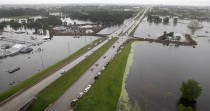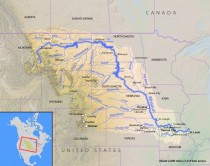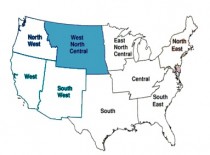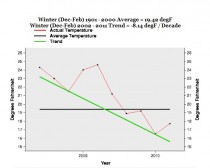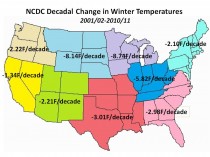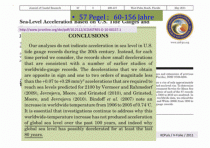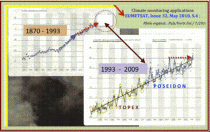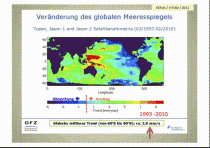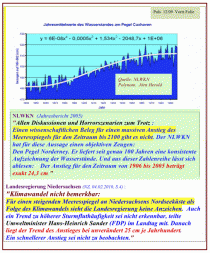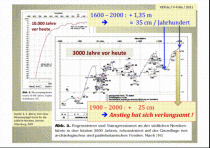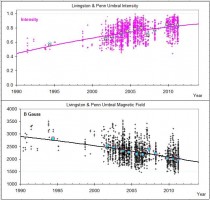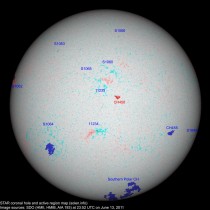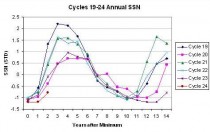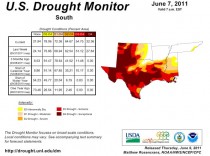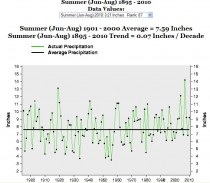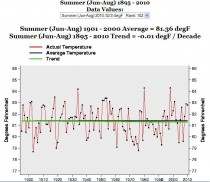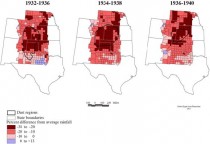By Patrick J. Michaels, Forbes
Almost every major American daily newspaper picked up an article published earlier this month by New York Times scribe Justin Gillis entitled “A Warming Planet Struggles to Feed Itself.”
How many times have we read, in the last 50 years, that this or that environmental apocalypse is going to starve the world? I got my doctorate on the wings of one; at that time it was called “global cooling,” after a 1974 CIA report leaked to the Times said that rapidly cooling planetary temperatures could usher in an era of heightened global instability caused by food shortages.
In my lifetime there have been a large number of predicted nutritional apocalypses, caused by overpopulation, lack of biological diversity in our food supply, genetic engineering run amok, acid rain, too little ozone, too much ozone and, finally, global warming. If there were futures on the end of the world, I’d go short. The wrong bet won’t matter anyway.
Facts: Global surface temperature rose about three-fourths of a degree Celsius in the 20th century. U.S. corn yields quintupled. Life expectancy doubled. People got fat. Global warming didn’t cause all of this, but increased atmospheric carbon dioxide directly stimulated plant growth. Further, greenhouse warming takes place more in the winter, which lengthens growing seasons. With adequate water, plants then fix and yield more carbohydrate.
While doing my dissertation I learned a few things about world crops. Serial adoption of new technologies produces a nearly constant increase in yields. Greater fertilizer application, improved response to fertilizer, better tractor technology, better tillage practices, old-fashioned genetic selection, and new-fashioned genetic engineering all conspire to raise yields, year after year.
Weather and climate have something to do with yields, too. Seasonal rainfall can vary a lot from year-to-year. That’s “weather.” If dry years become dry decades (that’s “climate") farmers will switch from corn to grain sorghum, or, where possible, wheat. Breeders and scientists will continue to develop more water-efficient plants and agricultural technologies, such as no-till production.
Adaptation even applies to the home garden. The tomato variety “heat wave” sets fruit at higher temperatures than traditional cultivars.
However, Gillis claims that “[t]he rapid growth in farm output that defined the late 20th century has slowed” because of global warming.
His own figures show this is wrong. The increasing trend in world crop yields from 1960 to 1980 is exactly the same as from 1980 to 2010. And per capita grain production is rising, not falling.
Gillis more rightly could have blamed any loss in per capita consumption on the stupid (I choose my words carefully) global warming policy that greens once touted: ethanol production from corn.
Even Al Gore now admits that corn-based ethanol produces more carbon dioxide than it saves. But as a result of recent ethanol policy, we are the first nation in world history to burn up its food supply to please a political faction.
Indur Goklany, a much-published scholar on the consequences of global warming policies, recently calculated that in 2010 alone, diversion of grain to biofuels (like ethanol) caused nearly 200,000 excess deaths in the developing world because of increased prices.
Roger Pielke, Jr., another noteworthy student of global warming science and policy, concurs. Regarding Gillis’ piece, he says: “The carbon dioxide-centric focus on the article provides a nice illustration of how an obsession with ‘global warming’ can serve to distract attention from factors that actually matter more for issues of human and environmental concern.”
Ever since people noticed how robust the increase of crop yields is, others have been saying that it must soon stop. This “limits to growth” argument is as tired as a farmer at the end of harvest. Two weeks ago, it was announced at the Global Wheat Rust Symposium that scientists are now producing “super varieties” of pathogen-resistant grain, which will tack another 15% onto yield. As the new strain is adopted, it will continue the linear upward trend in wheat yield for at least another decade.
I continue to be amazed at how little the facts are checked on global warming, even when writing for the so-called newspapers of record. Crop yields have increased at a constant rate despite changes in global temperature. Per capita grain production is going up, and stupid policies - not global warming - are putting people’s food security at risk.
Patrick J. Michaels is Senior Fellow in Environmental Studies at the Cato Institute and author of Climate Coup: Global Warming’s Invasion of our Government and our Lives.
By Steve McIntyre, Climate Audit
Breaking news: Today probably marks the closing chapter of the longstanding FOI request for CRUTEM station data. The UK Information Commissioner (ICO) has rendered a decision (see here) on Jonathon Jones’ appeal of the UEA’s refusal to provide Prof Jones with the CRUTEM station data that they had previously provided to Georgia Tech. The decision that can only be characterized as a total thrashing of the University of East Anglia.
Professor Jonathan Jones of Oxford University (like me, an alumnus of Corpus Christi, Oxford), is a Bishop Hill and CA reader and was one of several CA readers who requested the CRUTEM version sent to Georgia Tech earlier that year. (Contrary to disinformation from Nature, relatively few readers requested CRUTEM data; most FOI requests at the time were for the supposed confidentiality agreements prohibiting data being sent to “non-academics” - agreements that the University was unable to produce.
Jones’ request for CRUTEM data, like mine, was refused by UEA. Like me, Jones appealed the refusal at UEA (the first stage). On Oct 23, 2009, UEA rejected his appeal. (My appeal was rejected about 3 weeks later on the very eve of Climategate.) While I didn’t pursue the appeal to the ICO, Prof Jones did appeal and the present decision is the result of this appeal. I was unaware that this appeal was pending and the decision came as a surprise to me. Since the story started at CA, Andrew Montford and Prof Jones decided that news of the decision should also be broken here. I anticipate that Bishop Hill will also cover the story.
I urge readers to read the thoughtful decision. My own comments will be restricted to some legal aspects of the decision that intrigued me.
As a first comment on the University’s defence - in keeping with similar refusals of other requests, rather than focusing on their best line of argument,the practice of the UEA is to use a laundry list of exemptions - more or less throwing spitballs against the wall to see if any of them stuck. Many of the spitballs seem pretty strained, to say the least. In his ruling, the ICO picked each spitball off the wall and, in the process, established or confirmed a number of precedents that will hopefully encourage fewer spitballs in the future.
They attempted to use the following exemptions:
s 6 - “information already publicly available”
s 12(5)(a) - would have an adverse effect on “international relations, defence, national security or public safety”
s 12(5)(c) - would have an adverse effect on “intellectual property rights”
s 12(5)(f) - would have an adverse effect on the interests of the person who provided the information
The ruling on intellectual property rights interested me in particular, as UEA has attempted to apply this in other cases as well (e.g. Yamal, presently under appeal). The ICO observed that the mere existence of a copyright or database right did not demonstrate the application of s 12(5)(c), let alone the primacy of the exemption over the public interest test.
In addition to other arguments, the UEA claimed both copyright and database rights to the CRUTEM station data and argued that, if released to Prof Jones, they would “lose any right of commercial exploitation of its [CRUTEM] databases. Once the information was released and freely available, extraction and reutilization of the data could be carried out by any party without further recourse to the UEA”. The Commissioner dryly wondered how “UEA might have planned to commercially exploit the specific information requested and how disclosure might have impacted on any plants that it might have developed or been in the process of developing” before rejecting their arguments.
Some of the University’s arguments purporting to uphold their supposed “intellectual property rights” should rig as particularly contemptible to most members of the public. If climate scientists exhort the public to make personal sacrifices, it seems hypocritical that they should claim that their “intellectual property rights” prevent examination of data being used to underpin those requests to make sacrifices.
Lest the University be tempted to delay further, the Commissioner ordered the University to produce the requested data to Prof Jones within 35 days, stating:
Failure to comply with the steps described above may result in the Commissioner making written certification of this fact to ths High Court pursuant to section 54 of the Act and may be dealt with as a contempt of court.
I also remind readers of my own caveats about this data set and CRU’s reasons for withholding it - cautions expressed at the time (July 2009). My own surmise was that CRU’s data handling was trivial and that the only commercial interest that they were seeking to protect was their own - they didn’t want anyone to realize how little actual work was done by CRU into quality control, improving the quality of metadata or scientifically studying the nuts and bolts of temperature measurement. I also discouraged readers from assuming that CRU data was heavily adjusted from original data. The ongoing issue with CRU was a little different - they argued that UHI had negligible impact on their data set and thus adjustments were unnecessary. My recommendation at the time was that the function had become too important to be carried out in their part-time by professors at a small UK university, that Jones be thanked for his services and that responsibility for CRUTEM be transferred to the UK Met Office. This recommendation makes even more sense now.
Readers should also interpret this decision as case law. In another case involving a different sort of dataset, the ICO could readily find grounds to make a distinction from the circumstances of the relatively sui generis CRUTEM data set.
Congratulations to Prof (Jonathan) Jones for the remarkable success in this ruling. Perhaps Nature and other defenders of CRU obstruction will take note. POST.
By Joseph D’Aleo, CCM, AMS Fellow
Flood waters continue to increase into Minot, N.D., with about 15-20% of the city inundated with water and flood waters expected to increase in the coming days. About 12,000 residents have been evacuated from the previously-identified flood zones. Officials are considering additional evacuations as projections worsen. Water is flowing toward Minot from Canada faster than ever, due to record water levels upstream. The current forecast is for the crest to reach between 1,564 and 1,565 feet above sea level sometime during the overnight hours of June 25-26, and continuing through June 30. This crest would be more than 6 feet above record flood stage, and 9 feet above major flood stage.
Of course, there will be some like ‘Stagecraft Tim Wirth’ who milked this hoax into a lucrative UN post who proclaim this is further proof of global warming, which they project results in more moisture and extremes of flooding and drought. They claim spring snowmelt comes earlier resulting in rapidly disappearing glaciers.
The data shows they are wrong...again. Here is the Missouri River Basin stretching from the Northern Rockies through the northern Plains to the Mississippi.
Here was the snow water equivalent as of May 1, 2011. Only southernmost Colorado and New Mexico and Arizona had below normal snow packs and water equivalent in the snowpacks.
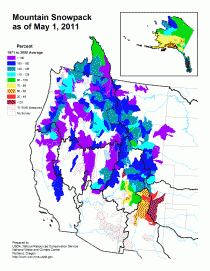
Enlarged.
Many areas of the west had over 180% of the normal. Snow still is abnormally very deep in parts of the mountainous west. The melting of the snow coinciding with heavy rains this spring as the same active La Nina storm track shifted slowly north is what brought the flooding (90 day anomalies of over 16 inches).
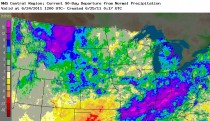
Enlarged.
So why is this not the result of global warming. WELL, BECAUSE WINTERS ARE COOLING....AT THE SECOND FAST DECADAL RATE OF ANY PERIOD SINCE 1895!!! (8.14F/decade or 81.4F per century! - only the decade ending in 1950 had a slightly greater cooling, a -0.85F/decade). This is true in the Missouri River basin and the country as a whole (with a cooling of 4.13F per decade) Here is the winter trend the last decade for the NCDC North Central Region over which the Missouri River flows - Montana, Wyoming, North Dakota, South Dakota and Nebraska.
On Weatherbell.com last week, we followed this up with a detailed analysis of temperature trends in all 8 NCDC climate regions for the winter.
Every one of the 8 regions has shown significant decadal scale cooling. Cooling results in a squeezing out of moisture from the air. All condensation is the result of a cooling not a warming process - water droplets condense on the outside of ICE WATER not HOT COFFEE.
this region was not alone. In fact all 8 US NCDC regions showed cooling the last decade in winters (PDF).
The hemispheric snowpack has been increasing during this cooling. This last winter was the third greatest for the Northern Hemisphere behind 2009/10 and 1977/78 and just ahead of 2007/08. See a pattern. COOLING IS HAPPENING AT AN ALARMING RATE.
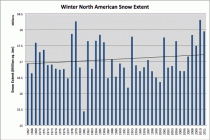
Enlarged.
By P Gosselin, No Trick’s Zone on 23. Juni 2011
What follows in English is a summary version of a piece appearing here at the European Institute for Climate and Energy (EIKE) based in Germany, written by retired meteorologist Klaus-Eckart Puls.
PIK report: “Sea level rising fastest in 2000 years” turns out to be a quack! Data shows no change!
Sea levels are now rising faster than at any time in the last 2000 years claims a new hockey stick manufactured by Michael Mann and Stefan Rahmstorf. But that claim has already turned out to be bogus.
As nobody cares much about so-called climate change anymore, the Potsdam Institute For Climate Impact Research (PIK) had to come up with another scare story: rapidly rising sea levels. That claim is supported by a whopping 2 (cherry-picked) North Carolina coastal sediment cores, which the authors claim reflect sea level behaviour for the entire globe. Other (warmist) scientists have already dismissed the paper, like Jens Schröter of the Alfred Wegener Institute, who says Mann’s and Rahmstorf’s paper is “unsuitable for making predictions”.
The opposite is the reality
The new predictions of catastrophe are not based on actual MEASUREMENTS. Actual measurements made by coastal tide gauges and satellites show the opposite is likely happening, i.e. sea level rise is actually decelerating.
7 datasets that contradict the latest Mannian hockey-stick fantasy
(1) The US-Coastal Journal reports that sea level rise rate is clearly slowing down - based on tide gauge measurements, full publication here:
It is essential that investigations continue to address why this worldwide-temperature increase had not produced acceleration of global sea level over the past 100 years, and indeed why sea level has possibly decelerated for at the last 80 years.”
(2) EUMETSAT recently made public the GLOBAL sea level data/measurements. Result: No trace of an acceleration! See the following graphic:
3) The GFZ Potsdam reached the same result, showing that there is no global uniform trend. Moreover, many locations show a huge sea level drop!
(4) Norderney and Cuxhaven German coastal locations have records going back over 100 years, and so does the NLWKN Lower Saxony State Association and the state of Lower Saxony for the North Sea coast. These MEASUREMENTS too show no acceleration in sea level increase (text translated below):
The text in English:
NLWKN (Annual Report 2005)
“All the discussions and horror scenarios for nothing: There is no scientific basis for a massive increase in sea level by 2100. The NLWKN has an objective witness for saying this: the tide gauge of Nordeney. It provides for 100 years a consistent recording of the water level. From this data series you can read it: The increase for the time period from 1906 to 2005 is exacly 24.3 cm.
The state government of Lower Saxony:
“Climate change is not detectable: The state government sees no signs of an increasing sea level at the North Sea coast as a result of climate change. Also the trend of more frequent storm surges is not detectable, says Minister of the Environment Hans-Heinrich Sander (FDP) in the state perliament. The trend remains unchanged at 25 cm per century. A more rapid increase is not observed.”
It needs to be pointed out that since the last ice age, North Germany’s coastal land is sinking, while Scandinavia’s is rising.
5) Works from the Institute for Historical Coastal Research Wilhelmshaven also show completely different results from those of PIK and Mann:
The above chart shows that for the period of 1600 to 2000 sea level rose on average 35 cm/century. But from 1900 - 2000, it rose only 25 cm. That is a clear deceleration. Afterwards: The sea level in the recent years has risen even more slowly than in the 20th century! …there is no trace of any acceleration whatsoever.
(6) A NASA team of authors recently published a report that clearly highlighted two points:
(a) No acceleration in sea level exists
(b) The sea temperature shows a declining trend,
consequently there exists no thermally accelerated sea level increase:
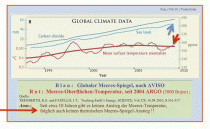
Enlarged.
Blue line: global sea level, as to AVISO; Red line: Sea surface temperature since 2004 ARGO (3000 bouys)
(7) Even the IPCC came to the same conclusion that there is no acceleration. With each report the projected sea level for the year 2100 was revised downwards every time - now it is projected to be only 40 cm:
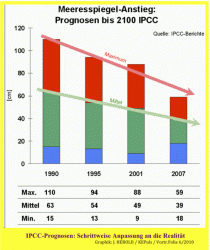
Enlarged.
IPCC prognoses: Step-by-step returning to reality.
Finally, when one takes into account that the PIK and Mann author-team are known worldwide as alarmists, e.g. Michael Mann (hockey stick inventor), Stefan Rahmstorf (PIK) et al., then considerable doubt on the credibility of this doomsday paper is in complete order.
The critique of the sea level alarmism can be found here.
Klaus-Eckart Puls - EIKE
(Translation/editing by P. Gosselin) H/T Marc Morano
FOR IMMEDIATE RELEASE
Tuesday, June 21, 2011
Contacts:
Christopher Horner, chris.horner@atinstitute.org
Paul Chesser, executive director, paul.chesser@atinstitute.org
American Tradition Institute’s Environmental Law Center today filed a lawsuit in federal district court in the District of Columbia to force the National Aeronautics and Space Administration (NASA) to release ethics records for taxpayer-funded global warming activist Dr. James Hansen - specifically records that pertain to his outside employment, revenue generation, and advocacy activities.
ATI seeks to learn whether NASA approved Hansen’s outside employment, which public financial disclosures and other documents reveal to have brought him at least $1.2 million in the past four years. This money comes in addition to - and, more troubling from an ethics and legal perspective, is all related to - his taxpayer-funded employment. Dr. Hansen’s outside employment commenced when he increased his “global warming” activism from his perch at NASA.
On January 19, ATI filed a Freedom of Information Act request with NASA’s Goddard Institute for Space Studies (GISS), which sought records detailing NASA’s and Hansen’s compliance with applicable federal ethics and financial disclosure laws and regulations, and with NASA Rules of Behavior. Thus far the agency has denied ATI’s request for Hansen’s Form 17-60s ("Application for permission for outside employment and other activity"), and ATI’s request for records of internal discussions about it.
NASA argues the release of the records would constitute a “clearly unwarranted violation of Hansen’s privacy rights,” and says ATI’s lengthy explanation of Dr. Hansen’s outside work “had not made the requisite showing that the documents requested would contribute to the public’s understanding of the activities of the Government, or how it would shed light on NASA’s performance of its statutory duties.”
ATI maintains that NASA’s compliance with ethics laws, and a senior employee’s outside revenue-generating activities, are patently of public interest, as is clear in the Ethics in Government Act of 1978. Dr. Hansen’s position requires him to file vastly more detailed Public Financial Disclosure filings (Form SF 278), which are made available to the public on request.
Dr. Hansen engages in high-profile public advocacy with regard to global warming and energy policy, directly trading on his platform as a NASA astronomer to gain interest and attention. This outside employment and other activities related to his work have included: consulting; highly compensated speeches; policy advocacy; a commercial book; advising Al Gore on his movie “An Inconvenient Truth;” and most recently, advising litigants on suing states and the federal government.
Since escalating the “provocative” (in Dr. Hansen’s word) nature of his advocacy in a 2006 “60 Minutes” interview, these outside activities have become extraordinarily lucrative - yielding on average more than a quarter of a million dollars per year in extra income between 2007 and 2010 from outside sources, all based upon the work he is paid by taxpayers to do for NASA.
“Under federal statutes and NASA rules, employees may not privately benefit from their public office,” said Christopher Horner, ATI’s director of litigation. “Outside income must be disclosed, certain activities avoided, and permission must be applied for before engaging in permissible outside employment or activities.
“ATI’s request seeks official documents which, if they exist, would inform the public about NASA’s and Dr. Hansen’s adherence to these ethics rules. Considering the records already obtained and the public record, compliance by NASA and Dr. Hansen is in doubt.”
Dr. Hansen has admitted that lucrative offers of “prizes” and “awards” for his public service began flowing after that “60 Minutes” interview, in which he accused the Bush administration of “censoring” his global warming views. Records show a sudden spike in highly compensated speeches on the subject of his work as well.
NASA has already provided Form 17-60 documents for Dr. Hansen’s subordinate Gavin Schmidt to the Competitive Enterprise Institute (CEI). Schmidt writes for and edits the climate alarmism blog RealClimate.org, during normal business hours. That Hansen and NASA had not required Schmidt to file Form 17-60 seeking permission for these activities - until NASA was asked about this matter - triggered ATI’s inquiry into whether Hansen, too, was avoiding this requirement. Other records obtained by CEI (and posted on ATI’s Web site) indicate that Dr. Hansen has also used NASA staff for his own commercial activities.
See also more here.
“The President and the Attorney General have made clear their commitment to transparency and a high standard of ethical behavior by government employees,” said Dr. David Schnare, Director of the ATI Environmental Law Center. “NASA needs to clear the air by releasing the documents about Dr. Hansen and about whether he had permission to wear his government hat when engaging in a lucrative effort to sway government policy.”
See ATI Environmental Law Center’s Complaint and Prayer for Declaratory and Injunctive Relief in federal court in its Freedom of Information Act case against NASA (PDF).
Visit ATI Environmental Law Center’s Web page for all documents, press releases and media coverage in its case against NASA.
For an interview with American Tradition Institute senior director of litigation Christopher Horner, email chris.horner@atinstitute.org or call (202)670-2680.
By Bill Gray, AMS Fellow, Charney Award recipient, and over 50-year member
I am very disappointed at the downward path the AMS has been following for the last 10-15 years in its advocacy of the Anthropogenic Global Warming (AGW) hypothesis. The society has officially taken a position many of us AMS members do not agree with. We believe that humans are having little or no significant influence on the global climate and that the many Global Circulation Climate Model (GCMs) results and the four IPCC reports do not realistically give accurate future projections. To take this position which so many of its members do not necessarily agree with shows that the AMS is following more of a political than a scientific agenda.
The AMS Executive Director Keith Seitter and the other AMS higher-ups and the Council have not shown the scientific maturity and wisdom we would expect of our AMS leaders. I question whether they know just how far off-track the AMS has strayed since they foolishly took such a strong pro-AGW stance.
The American Meteorological Society (AMS) was founded in 1919 as an organization dedicated to advancing scientific knowledge of weather and climate. It has been a wonderful beacon for fostering new understanding of how the atmosphere and oceans function. But this strong positive image is now becoming tarnished as a result of the AMS leadership’s capitulating to the lobby of the climate modelers and to the outside environmental and political pressure groups who wish to use the current AMS position on AGW to help justify the promotion of their own special interests. The effectiveness of the AMS as an objective scientific organization is being greatly compromised.
We AMS members have allowed a small group of AMS administrators, climate modelers, and CO2 warming sympathizers to maneuver the internal workings of our society to support AGW policies irrespective of what our rank-and-file members might think. This small organized group of AGW sympathizers has indeed hijacked our society.
The AMS should be acting as a facilitator for the scientific debate on the pro and con aspects of the AGW hypothesis, not to take a side in the issue. The AMS has not held the type of open and honest scientific debates on the AGW hypothesis which they should have. Why have they dodged open discussion on such an important issue? I’ve been told that the American Economic Society does not take sides on controversial economic issues but acts primarily to help in stimulating back and forth discussion. This is what the AMS should have been doing but haven’t.
James Hansen’s predictions of global warming made before the Senate in 1988 are turning out to be very much less than he had projected. He cannot explain why there has been no significant global warming over the last 10-12 years.
Many of us AMS members believe that the modest global warming we have observed is of natural origin and due to multi-decadal and multi-century changes in the globe’s deep ocean circulation resulting from salinity variations. These changes are not associated with CO2 increases. Most of the GCM modelers have little experience in practical meteorology. They do not realize that the strongly chaotic nature of the atmosphere-ocean climate system does not allow for skillful initial value numerical climate prediction. The GCM simulations are badly flawed in at least two fundamental ways:
1. Their upper tropospheric water vapor feedback loop is grossly wrong. They assume that increases in atmospheric CO2 will cause large upper-tropospheric water vapor increases which are very unrealistic. Most of their model warming follows from these invalid water vapor assumptions. Their handlings of rainfall processes are quite inadequate.
2. They lack an understanding and treatment of the fundamental role of the deep ocean circulation (i.e. Meridional Overturning Circulation - MOC) and how the changing ocean circulation (driven by salinity variations) can bring about wind, rainfall, and surface temperature changes independent of radiation and greenhouse gas changes. These ocean processes are not properly incorporated in their models. They assume the physics of global warming is entirely a product of radiation changes and radiation feedback processes. They neglect variations in global evaporation which is more related to surface wind speed and ocean minus surface and air temperature differences. These are major deficiencies.
The Modelers’ Free Ride. It is surprising that GCMs have been able to get away with their unrealistic modeling efforts for so long. One explanation is that they have received strong support from Senator/Vice President Al Gore and other politicians who for over three decades have attempted to make political capital out of increasing CO2 measurements. Another reason is the many environmental and political groups (including the mainstream media) have been eager to use the GCM climate results as justification to push their own special interests that are able to fly under the global warming banner. A third explanation is that they have not been challenged by their peer climate modeling groups who apparently have seen possibilities for similar research grant support and publicity by copying Hansen and the earlier GCM modelers.
I anticipate that we are going to experience a modest naturally-driven global cooling over the next 15-20 years. This will be similar to the weak global cooling that occurred between the early-1940s and the mid-1970s. It is to be noted that CO2 amounts were also rising during this earlier cooling period which were opposite to the expected CO2-temperature association.
An expected 15-20 year cooling will occur (in my view) because of the current strong ocean Meridional Overturning Circulation (MOC) that has now been established in the last decade and a half and ought to continue for another couple of decades. I explain most of the last century and-a-half general global warming since the mid-1800s (start of the industrial revolution) to be a result of a long multi-century slowdown in the ocean’s MOC circulation. Increases of CO2 could have contributed only a small fraction (0.1-0.2C) of the roughly ~ 0.7C surface warming that has been observed since 1850. Natural processes have had to have been responsible for most of the observed warming over the last century and a half.
Debate. The AMS is the most relevant of our country’s scientific societies as regards to its members having the most extensive scientific and technical background in meteorology and climate. It should have been a leader in helping to adjudicate the claims of the AGW advocates and their skeptical critics. Our country’s Anglo-Saxon derived legal system is based on the idea that the best way to get to the truth is to have opposite sides of a continuous issue present their differing views in open debate before a non partisan jury. Nothing like this has happened with regards to the AGW issue. Instead of organizing meetings with free and open debates on the basic physics and the likelihood of AGW induced climate changes, the leaders of the society (with the backing of the society’s AGW enthusiasts) have chosen to fully trust the climate models and deliberately avoid open debate on this issue. I know of no AMS sponsored conference where the AGW hypothesis has been given open and free discussion. For a long time I have wanted a forum to express my skepticism of the AGW hypothesis. No such opportunities ever came within the AMS framework. Attempts at publication of my skeptic views have been difficult. One rejection stated that I was too far out of the mainstream thinking. Another that my ideas had already been discredited. A number of AGW skeptics have told me they have had similar experiences.
The climate modelers and their supporters deny the need for open debate of the AGW question on the grounds that the issue has already been settled by their model results. They have taken this view because they know that the physics within their models and the long range of their forecast periods will likely not to be able to withstand knowledgeable and impartial review. They simply will not debate the issue. As a defense against criticism they have resorted to a general denigration of those of us who do not support their AGW hypothesis. AGW skeptics are sometimes tagged (I have been) as no longer being credible scientists. Skeptics are often denounced as tools of the fossil-fuel industry. A type of McCarthyism against AGW skeptics has been in display for a number of years.
Recent AMS Awardees. Since 2000 the AMS has awarded its annual highest award (Rossby Research Medal) to the following AGW advocates or AGW sympathizers; Susan Solomon (00), V. Ramanathan (02), Peter Webster (04), Jagadish Shukla (05), Kerry Emanuel (07), Isaac Held (08) and James Hansen (09). Its second highest award (Charney Award) has gone to AGW warming advocates or sympathizers; Kevin Trenberth (00), Rich Rotunno (04), Graeme Stephens (05) Robert D. Cess (06), Allan Betts (07), Gerald North (08) and Warren Washington and Gerald Meehl (09). And the other Rossby and Charney awardees during this period are not known to be critics of the AGW warming hypothesis.
The AGW biases within the AMS policy makers is so entrenched that it would be impossible for well known and established scientists (but AGW skeptics) such as Fred Singer, Pat Michaels, Bill Cotton, Roger Pielke, Sr., Roy Spencer, John Christie, Joe D’Aleo, Bob Balling, Jr., Craig Idso, Willie Soon, etc. to ever be able to receive an AMS award - irrespective of the uniqueness or brilliance of their research.
What Working Meteorologists Say. My interaction (over the years) with a broad segment of AMS members (that I have met as a result of my seasonal hurricane forecasting and other activities) who have spent a sizable portion of their careers down in the meteorological trenches of observations and forecasting, have indicated that a majority of them do not agree that humans are the primary cause of global warming. These working meteorologists are too experienced and too sophisticated to be hoodwinked by the lobby of global climate modelers and their associated propagandists. I suggest that the AMS conduct a survey of its members who are actually working with real time weather-climate data to see how many agree that humans have been the main cause of global warming and that there was justification for the AMS’s 2009 Rossby Research Medal (highest AMS award) going to James Hansen.
Global Environmental Problems. There is no question that global population increases and growing industrialization have caused many environmental problems associated with air and water pollution, industrial contamination, unwise land use, and hundreds of other human-induced environmental irritants. But all these human-induced environmental problems will not go away by a draconian effort to reduce CO2 emissions. CO2 is not a pollutant but a fertilizer. Humankind needs fossil-fuel energy to maintain its industrial lifestyle and to expand this lifestyle in order to be able to better handle these many other non-CO2 environmental problems. There appears to be a misconception among many people that by reducing CO2 we are dealing with our most pressing environmental problem. Not so.
It must be remembered that advanced industrial societies do more for the global environment than do poor societies. By greatly reducing CO2 emissions and paying a great deal more for our then needed renewable energy we will lower our nation’s standard of living and not be able to help relieve as many of our and the globe’s many environmental, political, and social problems.
Obtaining a Balanced View on AGW. To understand what is really occurring with regards to the AGW question one must now bypass the AMS, the mainstream media, and the mainline scientific journals. They have mostly been preconditioned to accept the AGW hypothesis and, in general, frown on anyone not agreeing that AGW is, next to nuclear war, our society’s most serious long range problem.
To obtain any kind of a balanced back-and-forth discussion on AGW one has to consult the many web blogs that are both advocates and skeptics of AGW. These blogs are the only source for real open debate on the validity of the AGW hypothesis. Here is where the real science of the AGW question is taking place. Over the last few years the weight of evidence, as presented in these many blog discussions, is beginning to swing against the AGW hypothesis. As the globe fails to warm as the GCMs have predicted the American public is gradually losing its belief in the prior claims of Gore, Hansen, and the other many AGW advocates.
Prediction. The AMS is going to be judged in future years as having foolishly sacrificed its sterling scientific reputation for political and financial expediency. I am sure that hundreds of our older deceased AMS members are rolling in their graves over what has become of their and our great society. PDF
Update: Be sure to see James Delingpole’s 10 Reasons to be cheerful about the coming new ice age.
By Anthony Watts, Watts Up With that
It looks like Livingston and Penn are getting some long deserved recognition. See their graph below:
From the WUWT solar reference page. Note: when the B gauss reading of sunspots hits 1500, they will no longer have enough contrast to be visible. That may occur at or near the years 2015-2017.
The American Astronomical Society meeting in Austin has just made a major announcement on the state of the sun. Sunspots may be on the way out and an extended solar minimum may be on the horizon.Fron Space.com reporting from the conference:
Some unusual solar readings, including fading sunspots and weakening magnetic activity near the poles, could be indications that our sun is preparing to be less active in the coming years.
The results of three separate studies seem to show that even as the current sunspot cycle swells toward the solar maximum, the sun could be heading into a more-dormant period, with activity during the next 11-year sunspot cycle greatly reduced or even eliminated.
The results of the new studies were announced today (June 14) at the annual meeting of the solar physics division of the American Astronomical Society, which is being held this week at New Mexico State University in Las Cruces.
Currently, the sun is in the midst of the period designated as Cycle 24 and is ramping up toward the cycle’s period of maximum activity. However, the recent findings indicate that the activity in the next 11-year solar cycle, Cycle 25, could be greatly reduced. In fact, some scientists are questioning whether this drop in activity could lead to a second Maunder Minimum, which was a 70-year period from 1645 to 1715 when the sun showed virtually no sunspots.
“We expected to see the start of the zonal flow for Cycle 25 by now, but we see no sign of it,” Hill said. “This indicates that the start of Cycle 25 may be delayed to 2021 or 2022, or may not happen at all.”
If the models prove accurate and the trends continue, the implications could be far-reaching.
“If we are right, this could be the last solar maximum we’ll see for a few decades,” Hill said. “That would affect everything from space exploration to Earth’s climate.”
More on this as it unfolds.
See also these previous WUWT posts leading up to this on Anthony’s post and the comments here.
See also from Solar Terrestrial Activity Report site, the weak magnetic areas without any strong spots on the sun today. The sunspot number for the day was 16 and the solar flux just 86.6. CHs are coronal holes. No sunspots but often are sources for ionized material to stream well into space.
We are two and one half years after the solar minimum in December 2008. In recent cycles, activity was rapidly approaching the peak three years after the minimum. The last cycle peaked at a sunspot number of 120, about 25% lower than the prior two cycles. Solar flux reached over 200.
By Joseph D’Aleo, CCM, WeatherBell Analytics Co-Chief Meteorologist
“Based on Palmer Drought Severity Index values, this is the third-worst drought Texas has ever seen in the month of May,” Nielsen-Gammon writes in his blog, the Climate Abyss. “Records go back to 1895. May also marks the end of the driest eight-month period on record.
The worst droughts remain those in 1918 (one of JB and my analogs for last winter) and 1956, according to Texas State Climatologist Nielsen-Gammon. According to the U.S. Drought Monitor, nearly 50 percent of the state remained in what is termed an “exceptional” drought, which means a once in 50-year occurrence. More than 90 percent of the state was experiencing either a severe or exceptional drought. Only parts of north central and northeast Texas were not at least abnormally dry as of May 31.
You can see the clustering of drought years for Texas in the 1950s and in the 1930s in the graph that follows. For the United States as a whole the 1930s was the worst decade for drought - The Dust Bowl Years.
Summer heat the last century peaked in 1934, 1980 and 1998 in Texas with no discernable trend since 1895.
During the 1930s drought, the persistent dryness in the south central built the central heat ridge further and further north eventually setting all time records in many states.

Technically, the driest region of the Plains - southeastern Colorado, southwest Kansas and the panhandles of Oklahoma and Texas - became known as the Dust Bowl, and many dust storms started there. But the entire region, and eventually the entire country, was affected.
The Dust Bowl got its name after Black Sunday, April 14, 1935. More and more dust storms had been blowing up in the years leading up to that day. In 1932, 14 dust storms were recorded on the Plains. In 1933, there were 38 storms. By 1934, it was estimated that 100 million acres of farmland had lost all or most of the topsoil to the winds. By April 1935, there had been weeks of dust storms, but the cloud that appeared on the horizon that Sunday, the 14th, was the worst. Winds were clocked at 60 mph. Day became night.

The day after Black Sunday, an Associated Press reporter used the term “Dust Bowl” for the first time. In the central and northern plains, dust was everywhere. The dust bowl was caused not just by the dry weather but also by unwise farming practices. Earlier settlers plowed under the natural tall grasses that covered the plains and planted crops they had planted in the wetter East. When the drought came, the crops failed, the ground was uncovered and the incessant winds produced the dust storms.
After the dust bowl, farmers ended over-cropping, over-grazing and improper farm methods. Since then wheat which is tolerant of drier conditions was grown in the semiarid west and other crops further east
Dry ground enhances heat. Heat can expand north and east (sometimes even west). This can be clearly seen in the plot of record highs for Des Moines, Iowa for June and July. Note 33 of the records were in the 1930s and interestingly none since 1988.
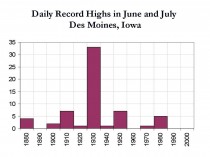
Enlarged.
This is true actually for all the states. The 1930s show the most state all-time record highs than any other decade, the 1950s second. The cold records actually peaked in the 1980s and 1960s.
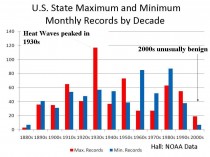
Enlarged.
Here is another NOAA image of a dust storm during the 1930s approaching Stratford, TX
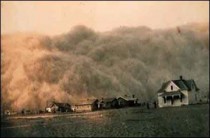
Those who have registered on WeatherBell can see the rest of this story with more images and also daily blogs by Joe Bastardi, Co-chief meteorologist and I on Weatherbell.com. We also provide more detailed global analysis and forecasts including long range for global regions for energy and agriculture and retail. Recent blogs have covered the tornadoes, floods and brief heat wave and have explained why the pattern like 2008 and 2009 is in transition to a cooler and wetter one again for the major growing areas while they continue to bake in Texas west to Arizona. We also explained why it would turn wetter and cooler in the UK but dryness should continue to be a problem as we forecast two months ago for France. Watch out for cold and maybe snow again in Argentina the next two weeks with cold reaching into Brazil.
I did stories on the Hurricane of ‘38 and Hurricane Carol and both of us did detailed hurricane season outlooks.
See also a video from FOX BUSINESS with Joe Bastardi on Weatherbell’s home page explaining the wild weather. We had both predicted the floods and tornado outbreaks in the late winter for the spring and the Texas drought last fall. Please join us.
SPPI Blog: Source: Master Resource
[Editor’s note: The following material was supplied to us by Dr. Richard Lindzen as an example of how research that counters climate-change alarm receives special treatment in the scientific publication process as compared with results that reinforce the consensus view. In this case, Lindzen’s submission to the Proceedings of the National Academy of Sciences was subjected to unusual procedures and eventually rejected (in a rare move), only to be accepted for publication in the Asian Pacific Journal of Atmospheric Sciences.
I, too, have firsthand knowledge about receiving special treatment. Ross McKitrick has documented similar experiences, as have John Christy and David Douglass and Roy Spencer, and I am sure others. The unfortunate side-effect of this differential treatment is that a self-generating consensus slows the forward progress of scientific knowledge- a situation well-described by Thomas Kuhn is his book The Structure of Scientific Revolutions. - Chip Knappenberger]
“If one reads [our new] paper, one sees that it is hardly likely to represent the last word on the matter. One is working with data that is far from what one might wish for. Moreover, the complexity of the situation tends to defeat simple analyses. Nonetheless, certain things are clear: models are at great variance with observations, the simple regressions between outgoing radiation and surface temperature will severely misrepresent climate sensitivity, and the observations suggest negative rather than positive feedbacks.” - Richard S. Lindzen
...
To: rlindzen@mit.edu
Subject: PNAS: 2010-15738 (On the observational determination of cl…)
Cc: ekavanagh@nas.edu
From: mpiotrowski@nas.edu
Date: Wed, 19 Jan 2011 13:05:24 -0500
Message-Id: <44129546032491@ejpweb15>
Dear Dr. Lindzen,
I am contacting you regarding your contributed paper. Attached is a letter from Randy Schekman.
Sincerely,
May Piotrowski
Editorial Manager
PNAS
The attachment was a polite rejection of our paper. Included were the complete reviews. Although some of the points in the reviews were, in fact, addressed in our paper, we thought it advisable to respond to the reviews in detail, and to revise our paper in order to clarify matters. It was, however, clear, that the revised paper would no longer satisfy the space constraints of PNAS - especially since the reviewers made clear that important material should not be relegated to ‘supplementary material’.
Although Schekman’s rejection could be interpreted as mildly encouraging, our experience has been that any attempt to resubmit a revised paper simply leads to further delay culminating in re-rejection. Our final letter to Schekman (Letter_to_Schekman.pdf) is attached. As already noted, we chose to respond in detail to each review, and these responses are attached (Response.pdf). The revised paper (as well as the original version submitted to the PNAS: Lindzen-Choi-PNASSubmission.pdf) is also attached (Lindzen-Choi-APJAS.pdf). The final version is accepted (following review) by the Asian Pacific Journal of Atmospheric Sciences.
If one reads the paper, one sees that it is hardly likely to represent the last word on the matter. One is working with data that is far from what one might wish for. Moreover, the complexity of the situation tends to defeat simple analyses. Nonetheless, certain things are clear: models are at great variance with observations, the simple regressions between outgoing radiation and surface temperature will severely misrepresent climate sensitivity, and the observations suggest negative rather than positive feedbacks.
By Jane Kennedy, ABC Australia
The palaeontologist sat back and watched as climate change and rising sea levels rapidly became a part of the public psyche, but he remains adamant that the rising sea is not a result of man-made global warming.
“In the aspect of anthropogenic global warming I’m a sceptic and proud...I would argue that every scientist is actually a sceptic,” Dr Deacon says.
Dr Deacon says that by determining the temperature and carbon dioxide levels at which fossils first formed, “we see that actually the patterns that have occurred in the distant past are not really any different from what’s happening now.”
Unlike many environmental scientists who look back hundreds of years, Dr Deacon’s research goes back hundreds of millions of years.
“Our earliest atmosphere had no oxygen in it and actually had carbon dioxide levels of about 10%,” he says of Cambrian times some 600 million years ago.
Today’s current carbon dioxide levels are at 0.038 %, “in geological terms the lowest level that we’ve actually had of carbon dioxide in earth’s history.”
Dr Deacon contends that humans increased production of carbon dioxide is making the world warmer, in fact scientific research shows that “as the earth warms, usually through natural causes, the carbon dioxide levels follow.”
Referring to the renowned Vostok ice core graph Dr Deacon explains how “about 800 years ago the sea levels were rising at about 14 millimetres per year.”
“Well currently the sea level is rising arguably between one and three millimetres per year, so its rising very very much slower than it was at that time… carbon dioxide wasn’t driving the changes in any of those plots and is probably not driving it now.”
“So really if you’re going to say that we actually have man-made global warming that has a runaway greenhouse where sea levels are rising faster than ever, absolutely not.”
Dr Geoff Deacon will be presenting his lecture ‘What fossils tell us about sea-levels and climate change’ at the WA Museum in Geraldton on Thursday June 9 at 7.00pm and Friday June 10 at 10.00 am.
Listen here as Dr Geoff Deacon speaks with Glenn Barndon on ABC Midwest and Wheatbelt Mornings.
Alarmists refuse to take on skeptical geologists
By Tom Harris
Anyone not already familiar with the stance of geologists towards the global warming scare would have been shocked by the conference at the University of Ottawa at the end of May. In contrast to most environmental science meetings, climate skepticism was widespread among the thousand geoscientists from Canada, the United States and other countries who took part in GAC-MAC 2011 (the Joint Annual Meeting of the Geological Association of Canada, the Mineralogical Association of Canada, the Society of Economic Geologists and the Society for Geology Applied to Mineral Deposits).
The lead symposium of the conference, Earth climate: past, present, future, was especially revealing. Chaired by University of Toronto geology professor Andrew Miall, the session description starts: “The scientific debate about climate change is far from over. Some of the projections of climate change and its consequences contained in the 2007 Report of the Intergovernmental Panel on Climate Change (the United Nations’ IPCC) have been called into question. This symposium will address some of these issues and present a geological perspective on the scientific debate.”
The talks were from “climate rationalists,” defined by Australian geology professor Bob Carter of James Cook University as “persons who are critical (on balanced scientific grounds) of the IPCC’s alarmism ...reflecting the primacy that such persons give to empirical data and thinking. The climate rationalist approach contrasts markedly with the untestable worlds of computer virtual reality that so many climate alarmists now inhabit.”
Leading off the GAC-MAC climate symposium was fellow Australian, Ian Plimer, professor in the School of Civil, Environmental and Mining Engineering at the University of Adelaide. In a keynote presentation entitled Human-induced climate change: Why I am skeptical, Plimer completely dismantled the greenhouse-gas-driven climate-change hypothesis. He showed how climate has varied naturally on all time scales and how recent changes are not unusual. Plimer explained the lack of meaningful correlation between the greenhouse gas carbon dioxide (CO2) and planetary warming and cooling, and how “climate models throw no new light on climate processes.” He concluded, “Pollution kills, CO2 is plant food, H2O vapour is the main greenhouse gas. Humans can adapt to future changes.”
Following Plimer were 14 other climate presentations by leading geoscientists. Henrik Svensmark of the National Space Institute in Denmark spoke about how cosmic ray variations in the atmosphere are influencing climate by changing the microphysics of clouds. University of Ottawa emeritus professor Ján Veizer presented his research describing the role of the Sun and water vapour on CO2 and climate change. Calgary geophysicist Norm Kalmanovitch showed how satellite radiation measurements demonstrate that the “enhanced greenhouse effect” from greenhouse gas emissions has never even existed to any measurable extent. Carleton University researcher Hafida El Bilali showed how her work with paleoclimatologist professor Tim Patterson revealed that variations in the output of the Sun have had major influences on regional climate for the past nine millennia.
And so it continued. Although one speaker presented information that was consistent with IPCC claims, no other presentation in the symposium supported the UN’s human-caused dangerous global warming hypothesis. In the discussion period following the talks, climate rationalists decried the lack of media or public attention to the symposium or their research findings. In the exhibit hall, few participants seemed interested in human-caused global warming. The catastrophic messages that so overwhelm other climate-related conferences were nowhere to be found.
Where were all the other scientist supporters of climate alarmism? Did they not know that climate was a major focus of this, the largest geologic conference in the country?
They knew. According to Miall, even though some were directly invited, they either refused to participate or ignored the invitation. “The people on the IPCC side generally will not debate, explained Miall. Anything thats brought up that they disagree with, they say has been dealt with and is no longer considered important, or is a minor effect. This is often quite wrong.”
In the Q&A following the public lecture at last June’s Canadian Meteorological and Ocean Society (CMOS)/Canadian Geophysical Union Congress in Ottawa, the prospect of a public debate between the two sides was put to keynote speaker Warwick Vincent of Laval University. Vincent was supportive, as was a CMOS past president communicated with later. Yet, when I approached CMOS executives and directors about taking the steps necessary to arrange such a public event, the responses were negative to the point of abuse and nothing transpired.
This was perhaps not surprising. Proposals for a proper climate science debate have been opposed by CMOS leaders for a long time. As early as 1990, the chairman of the CMOS congress scientific committee, Tad Murty (then a senior research scientist with the Department of Fisheries and Oceans’ Institute of Ocean Sciences) tried to arrange a global-warming debate. But it never happened. Murty cites a “lack of enthusiasm” from other committee members as the reason.
When the Kyoto Protocol was created in December 1997, long-time CMOS member Madhav Khandekar (then just retired from his research scientist position at Environment Canada) highlighted several uncertainties in IPCC science and called for an open debate on the issue in the CMOS Bulletin. His article, Global warming & climate change in Canada: A need for an open scientific debate, was completely ignored by CMOS executives and its membership at large.
At this week’s congress in Victoria, CMOS, like many organizations of its ilk, still maintains a rigid stance of climate catastrophilia. The congress includes sessions described with clearly mistaken statements such as “Recent research has highlighted the irreversibility of CO2-induced climate change on centennial timescales...” Other, less extreme but also unjustified assertions abound: “It has become widely recognized that under a changing climate, the frequency and intensity of meteorological/hydrological extreme events and associated damage costs would more likely increase in the 21st century.”
The narrow-mindedness of CMOS and other climate alarmists matters because they have the ear of the mass media, most of which uncritically reports on CMOS’ statements that the science is settled and debate unnecessary. Recent surveys show that the public is highly influenced by these assertions and so seriously flawed CMOS messages are incorporated into government pronouncements.
Miall maintains that the views of geoscientists are crucial for a proper understanding of climate.
“This should have been accepted practice all along, not because geoscientists are necessarily right, but because this should be the normal process of science,” said Miall. “The idea that any science is ‘finished’ violates all the norms of the science process, which should, by definition, be permanently open to new data and new ideas. The history of science is full of examples of so-called ‘normal science’ that is shown to be wrong on the basis of a single critical piece of data or a new idea. That’s all we were trying to do at the GAC meeting - keep our minds open.”
Uncomfortable though it may be for geoscientists, society needs them to speak out forcefully now. Otherwise, the climate alarm, its science failing but the movement still heavily funded, will stagger on, leading society into wasting billions of dollars more and destroying millions of jobs worldwide.
Tom Harris is the executive director of the International Climate Science Coalition
Iowa National Guard troops have dumped thousand-pound sandbags from a helicopter to delay a full breach of a Missouri River levee long enough to build a secondary wall to protect a town, officials said on Monday.
The U.S. Army Corps of Engineers warned that the partial break of the levee near the Iowa and Missouri border could not be repaired and local emergency management officials have ordered a mandatory evacuation of the town of Hamburg, Iowa.
“What we have had is the Iowa National Guard come in and drop thousands of pounds of sandbags to help fill that breach, but that is just going to delay the full breach,” Corps spokeswoman Monique Farmer said on Monday.
It will take about a week to raise a secondary flood protection for Hamburg by five feet to reduce the risk to the town, Farmer said.
The National Guard dropped 22 sandbags weighing a thousand pounds each on the levee Sunday to patch the breach about 5-1/2 miles south of Hamburg, said John Benson, a spokesman for the Iowa Homeland Security and Emergency Management division.
The Corps plans an arc-shaped barrier to protect Hamburg’s south side and several hundred residents have been ordered to evacuate from that area, Benson said.
The evacuation covers about one-quarter of the town’s roughly 1,200 residents. A small fracture, a “sand boil,” discovered Sunday on another levee has been repaired, Farmer said.
More levee breaches on the lower Missouri River downstream from the last reservoir in South Dakota are “definitely likely,” said Kevin Grode, a reservoir regulation team leader for the Corps’ Missouri Basin office.
Nearly a year’s worth of rain fell on the Upper Missouri basin in the past few weeks, coupling with a heavy melting snow pack to swell reservoirs from Montana through South Dakota to their limits, forcing the Corps to release record flows to relieve the pressure.
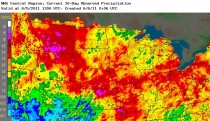
Enlarged 30 day rainfall.
Lynn Maximuk, central region director for the National Weather Service, said the rain and heavy snows were typical of a La Nina year weather pattern.
THOUSANDS EVACUATE
Thousands of residents have voluntarily evacuated the North Dakota capital Bismarck and nearby Mandan and the South Dakota capital Pierre and nearby Fort Pierre as well as the affluent Dakota Dunes near the Iowa border as the river threatens to overwhelm flood protections.
Levees in North Dakota and South Dakota were holding on Monday. South Dakota Governor Dennis Daugaard reported more progress on levees in flood-threatened towns as workers fought through temperatures into the 90s amid humid conditions.
The Corps plans to step up water releases to a maximum 150,000 cubic feet per second at the Oahe Dam above Pierre on Tuesday and at other reservoirs by mid June. Flows could stay at those levels at least into mid August.
“It is possible that we could go higher than that ... if we get higher than normal precipitation throughout June and July,” Grode said.
Iowa emergency officials are watching for maximum flows planned at the Gavins Point reservoir above Dakota Dunes on June 14 because it is the final control over river levels that will affect the levees near Hamburg.
Iowa is bracing for the Missouri to spill up to two miles into the state during the flooding and Fremont County has set up an emergency shelter in nearby Sidney for Hamburg residents who might need it. No one used the shelter overnight.
Iowa Governor Terry Branstad said on Monday he believed the flooding would be the worst he’s ever seen and that low-lying areas of Interstate 29 that runs parallel to the river likely would eventually be closed.
The U.S. Coast Guard has closed a more than 180-mile (290-kilometer) stretch of the river from near Sioux City, Iowa, south due to high water.
The river is projected to reach up to seven feet above flood stage at Sioux City, Omaha and Kansas City when the maximum release rate is reached.
The Missouri River basin forms the northwest portion of the massive Mississippi River basin that stretches from Montana to western New York and funnels water down through Louisiana into the Gulf of Mexico.
(By Kay Henderson. Additional reporting by David Bailey in Minneapolis; Editing by Greg McCune)
By NECN Meteorologist Tim Kelley
Are the publishers of Newsweek Magazine using scare mongering to sell copies, or do they really believe the Dogma presented on the Cover-
“Weather Panic, This is The New Normal” ?
One would think they learned a lesson 36 years ago with the Global Cooling Forecast debacle. Now Newsweek Reporter Sharon Begley writes “Even those who deny existence of Global Climate Change are having trouble dismissing the evidence of the last year”, then she goes on reiterating all the weather disasters that have occurred this year.
First off, are we talking about the supposed warming due to antrohropogenic CO2 emissions? How did the phrase ‘Global Warming’ morph into ‘Global Climate Change’? Sounds like a new marketing strategy.
Secondly, “the evidence of the last year”, is Sharon Begley stating that the weather is now different than we have ever seen? If so, she lacks due diligence in fact checking.
Sharon may not be familiar with the weather events that occurred beginning with the Galveston Hurricane of 1900 through the one of the worst Tornado seasons on record in 1953. And the New England Hurricanes of 1954. Included in that period is one the worst Floods on Record in The United States, in 1927, along with the Great New England Hurricanes of 1938, and 1944.
My Dad still refers to the 1944 Hurricane as the most severe weather event so far in his 82 years living on Cape Cod. That says a lot.
The weather extremes occurring now, leads me to believe that we may be experiencing a weather pattern similar to the extremes of 1900-1954. The problem is that today we have millions more people living in vulnerable areas like Cape Cod, Long Island, The Florida Keys, and New Orleans just to mention a few, that will bear the brunt of Major Land falling Hurricanes likely to return. Will we blame CO2?
The forecasts made by CO2 alarmists have failed.
We are getting record snows where we were supposed to see little or no snow, we are having floods where we were supposed to see widespread droughts. The atmosphere is cooling while CO2 levels continue to rise. At 390 parts per million of CO2, that leaves 999,610 parts of other compounds, including up to 4,000 parts per million of the more potent Greenhouse Gas, H2O.
As Harry Markopolos said about Bernie Madoff, “The Math does not Work”. His book ‘No One Would Listen’ is a perfect analog for what is going on with Al Gore and all the opportunists getting rich off the CO2 Scare. Except, Gore is perpetrating fraud on Governments around the world. Unfortunately, any fraud against government, is fraud against citizens.
There is nothing we can due to stop the weather. There are, however things we can due to adapt. Instead of spending billions lining the pockets of alarmists ‘reasearch’ and Cap & Tax regulation, imagine what we could accomplish by putting that money into reinforcing infrastructure and insuring our selves against the inevitable weather disasters that will continue. As we transition into a cooling atmosphere, a forecast more likely to be correct, we will likely suffer more from ice, than fire.
This week we have another late season snow storm ejecting from The Sierra Nevada (where a record snow pack will take months to melt, giving plenty of water to California this summer), that storm will cruise into southern Canada by Wednesday, By Thursday that storm will have produced another alarming severe weather outbreak, this one north and west of the hard hit areas form May. But here in New England we will see a push of warmth ahead of that storm, then an abrupt cold front Thursday Night, with another round of nasty thunder storms. It’s too early to call for more Tornadoes, but the possibility does exist. The nature of this severe weather season has as much to due with relentless cold form the northwest, as it does with record heat from Texas. Speaking of records, 35 this morning on Martha’s Vineyard broke the record low temperature for the day, 38 set June 5, 1958.
June 5 is also the anniversary of “The Great June Frost” of 1859, 2” snow in Ohio, 26 in New York.
The 2011 Hurricane Season has Begun, and may be off to a quick start.
Near Jamaica tonight is a tropical disturbance getting organized, it may be come Tropical Depression #1 for 2011, and perhaps Tropical Storm Arlene, near Cuba by Tuesday.
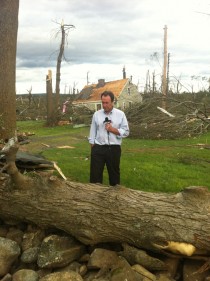
Tim on Haines Hill in Brimfield, MA June 2, 2011
See Tim’s post.
Radiation physics constraints on global warming: CO2 increase has little effectBy Denis G. Rancourt, Former physics professor, University of Ottawa, Ottawa, Canada
Historically, the greatest ability of the physicist has been to perform simple calculations that capture the essential features of a physical phenomenon in order to correctly elucidate the underlying principal causes. This is the ultimate “What is going on?” challenge.
Too many practicing physicists, in the many areas where physics is applied, have lost or never had this ability. Instead, they have been incorporated into the enterprise of using computers to simulate reality using questionable selections of approximate or invalid algorithms in large simulation programs.
These programs develop lives of their own, as careers and reputations are invested in their incremental development and in their predictions. A pathological optimism envelops the practitioners with the illusion that their algorithms capture complex features in some “average” or “effective” way and efforts are made to demonstrate this in so-called “validation” exercises rather than perform simple calculations that would demonstrate the algorithms themselves to be wrong for the intended application.
Physicists have largely abandoned their gadfly role of fundamentally challenging broad interpretive schemes in order to serve and benefit from career-enhancing collective enterprises, often dressed in elaborate conceptual edifices and often supported by computer simulations.
I believe this situation is playing itself out today in climate modelling science. As a physicist, if on close examination I can’t understand what the CO2 warming alarmism is about and I can’t get any of my colleagues to explain it - without computer-black-box magic, in published papers or elsewhere - then I am not going to believe it.
At its core, planetary surface temperature is a macroscopic radiation balance phenomenon that has been understood for one hundred years or so. If global warming alarmism is justified then it must be possible to explain why it is justified in simple terms and without appealing to faith or authority for any essential point in the argument.
I’ve tried to do this, as honestly and openly as possible, and I have asked my peers to find any errors. I believe the present article to be error-free and to conclusively show that we should not be focussed on CO2 if we are concerned about the planet’s surface temperature. I am additionally of the opinion that we should not be concerned about the planet’s surface temperature.
Regarding the sceptic-warmist debate, my conclusion is: The sceptics say many incorrect things but they are right whereas the warmists say many correct things but they are wrong. The skeptics appear to be motivated by skepticism whereas the warmists appear to be motivated by conformism. The incorrect things have been used to discredit the sceptics and the correct things have been used to mask a lie.
See more of Denis’s post and paper.
By Nick Anthony Fiorenza
Planetary warming has also been observed on Mars, Jupiter, Pluto, and on Neptune’s largest moon Triton during the decades following the peak of the “Solar Grand Maximum” - wonder why - there are no humans there! And Pluto is moving further from the sun in its orbit, thus it should be cooling, but instead it is warming. This is but one blatant indicator that suggests that the climate change on Earth is due to solar changes and our intersellar environment rather than mere human antics.
More importantly, the Sun is now changing from its Solar Grand Maximum to its Solar Grand Minimum. The Earth heats up after a Solar Grand Maximum, lagging a bit after the peak. With a Solar Grand Minimum now on its way, a “global cooling” may be on the horizon--a natural oscillation occurring in much longer solar cycles.
Latest science reveals that sharp increases in global warming “precede” sharp increases in CO2--not the other way around. Global warming causes more CO2 to be released form the oceans. Current research also shows that Earth’s oceans are now beginning to cool. It is also now clear that temperatures over the last century correlate far better with cycles in oceans than they do with carbon dioxide; and, the temperature cycles in oceans are caused by cycles of the sun.
Let the AGW (Anthropogenic Global Warming) advocates, as well as the media, continue to ignore all of this, perpetuating fear and advocating spending billions of dollars on non-solutions. Although humans contribute to greenhouse gases, the overall effect is a tiny fraction compared to natural causes. To say humans are the cause of global warming; and to also make predictions that global warming will continue to increase is simply inaccurate. This is not to ignore the silver lining of the global warming scare, as humanity must certainly learn to participate in harmony with nature, with the breath of the Earth and with her land and oceans; and with the cycles of the Sun, Moon, planets, and stars.
So let us act and change from knowledge about what is really going on rather than from misinformation fueled by mass-hysteria.
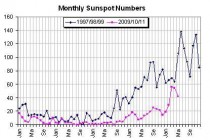
Enlarged Sunspot rise into cycle 23 versus rise into current cycle.
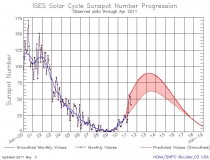
Enlarged Sunspot progression and forecast - solid is official. Range of other more likely forecasts shown.
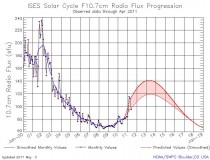
Enlarged Solar flux progression and forecast - solid is official. Range of other more likely forecasts shown.
The “Solar Grand Maximum” has ended - a science most often not considered by the advocates who profess that Global Warming is caused by man-made CO2”—those who perpetuate the global warming media scare.
See much more here.





